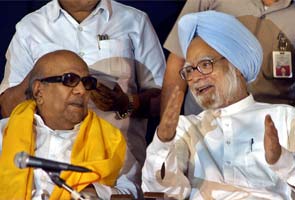
Chennai, September 20: After Mamata Banerjee's dramatic exit, the Congress is left without its biggest ally in the coalition it leads at the centre, but another big partner, the DMK, has made a welcome reassurance.
(After Mamata pullout, Congress gauges room for compromise: Top 10 facts)
Sources in the Southern party, which has 18 Lok Sabha MPs, say that the DMK has decided "not to embarrass the UPA" and that its course will not be affected by Ms Banerjee's pull-out last night, which has converted the UPA to a minority. The party, will however, participate in a bandh or strike called tomorrow to protest against the centre's new reforms.
Ms Banerjee said she could not remain part of the government after its decision last week to increase diesel prices, cap the amount of subsidized cooking gas available to households, and open up the retail market to foreign super-chains. (Who is Mamata Banerjee?)
Sources said this morning that a section of the DMK is in favour of following Ms Banerjee's lead and quitting the UPA, but was over-ruled. There are a few reasons why it would be politically expedient for the DMK to distance itself from the Congress now - a massive coal scam has over-shadowed the Congress, deepening the perception that it is a party infected with corruption. Like Ms Banerjee, any party that opts out of the UPA now can claim that it is doing so in the interest of the aam admi or common man, who will allegedly be hit hard by the government's new big-ticket reforms.
(Poll: Should the government give in to Mamata Banerjee?)
Tomorrow's strike against those new policies has won the support of parties ranging from the Left to the BJP, and crucially, Mulayam Singh Yadav, whose Samajwadi Party is now key for the government's survival. (Mulayam keeps UPA on tight leash, verdict on support tomorrow)
The DMK has in the recent past threatened twice to abandon the UPA. The first flashpoint was before the state elections in Tamil Nadu last year, which the DMK and Congress fought jointly. The DMK said it was not being given enough seats. Congress president Sonia Gandhi intervened to strike a compromise. However, the partnership was decimated in the polls. The DMK also flexed its muscle to pressure the Prime Minister to commit India's support to a UN resolution that asked Sri Lanka to investigate allegations of vast human rights violations against the island's minority Tamils in the final months of the civil war that ended in May 2009.
The DMK's allegiance to the government is also guided by the fact that two of its senior leaders, including the party president's daughter, are being tried for corruption in the telecom scam. The case is being investigated by the CBI, which, opposition parties, is often used by the ruling party to settle political scores or offer protection.








Comments
Add new comment